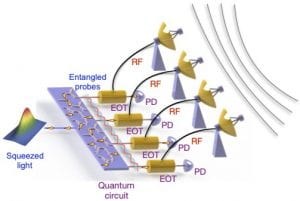Quantum phenomena, such as entanglement, can boost the performance of sensing and detection. On the fundamental side, we recently derived the ultimate limits of quantum channel discrimination [1]. On the application side, our group has solved the optimal receiver design problem in quantum illumination in the past [2,3]. We also proposed to utilize entanglement to assist absorption spectroscopy that are widely applicable to various scenarios [4]. More recently, we generalize the quantum advantage in quantum illumination to important radar detection tasks such as target ranging [5] and revealed 10s of dB quantum advantage from entanglement in the range-delay accuracy [6].

Distributed quantum sensing (DQS) enhances the measurement precision of global parameters in a sensor network via multipartite entanglement. Our group led the initial design of DQS in the optical domain [7], and provided the theory support for the first experimental demonstration of a
reconfigurable entangled sensor network [8]. To cope with noise and loss, my group and collaborators have proposed using continuous-variable quantum error correction to assist DQS systems that operate under noise [9]. See our recent invited topical review for Quantum Science and Technology [10] for a summary of the current state-of-the-art for DQS.
Quantum metrology has wide applications. One of our recent focus is to understand its role in dark matter search, such as applying DQS technique to microwave haloscopes [11,12].

We are part of:
DoE Superconducting Quantum Materials and Systems Center
Recent publications:
-
[1] Ultimate Limits for Multiple Quantum Channel Discrimination, Q. Zhuang and S. Pirandola, Phys. Rev. Lett. 125, 080505 (2021)
-
[2] Optimum Mixed-State Discrimination for Noisy Entanglement-Enhanced Sensing, Q. Zhuang, Z. Zhang, and J. H. Shapiro, Phys. Rev. Lett. 118, 040801 (2017).
-
[3] Quantum Illumination for Enhanced Detection of Rayleigh-Fading Targets, Q. Zhuang, Z. Zhang, and J. H. Shapiro, Phys. Rev. A 96, 020302 (2017).
-
[4] Entanglement-Assisted Absorption Spectroscopy, Haowei Shi, Zheshen Zhang, Stefano Pirandola, and Quntao Zhuang, Phys. Rev. Lett. 125, 180502 (2020).
-
[5] Quantum Ranging with Gaussian Entanglement, Q. Zhuang, Phys. Rev. Lett. 126, 240501 (2021).
-
[6] Ultimate Accuracy Limit of Quantum Pulse-Compression Ranging, Q. Zhuang and J. H. Shapiro, ArXiv 2109.11079 (2021).
-
[7] Distributed Quantum Sensing Using Continuous-Variable Multipartite Entanglement, Q. Zhuang, Z. Zhang, and J. H. Shapiro, Phys. Rev. A 97, 032329 (2018).
-
[8] Demonstration of a Reconfigurable Entangled Radio-Frequency Photonic Sensor Network, Y. Xia, W. Li, W. Clark, D. Hart, Q. Zhuang, and Z. Zhang, Phys. Rev. Lett. 124, 150502 (2020).
-
[9] Distributed Quantum Sensing Enhanced by Continuous-Variable Error Correction, Q. Zhuang, J. Preskill, and L. Jiang, New J. Phys. 22, 022001 (2020).
-
[10] Distributed Quantum Sensing, Z. Zhang and Q. Zhuang, Quantum Sci. Technol. 6, 043001 (2021).
- [11] Searches for New Particles, Dark Matter, and Gravitational Waves with SRF Cavities, A. Berlin, … , Q. Zhuang, Snowmass 2021, arXiv:2203.12714 (2022).
- [12] Entangled sensor-networks for dark-matter searches, A. J. Brady, C. Gao, R. Harnik, Z. Liu, Z. Zhang, Q. Zhuang, arXiv:2203.05375 (2022). To appear on PRX Quantum.